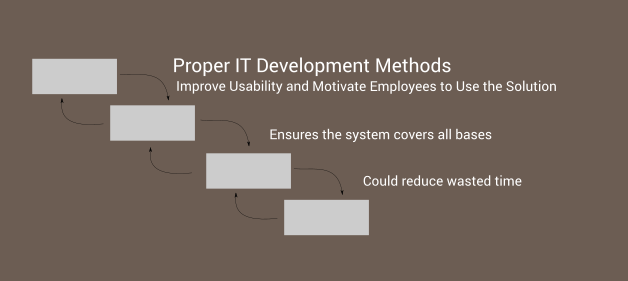When a project is at its initial planning stages, it is important that the communication between the customer and the IT system’s creator is maintained to ensure that the project is what the customer wants and needs, that the project meets the customer’s requirements and at the same time a list of requirements is drawn up for the customer to confirm, In doing so it ensures that the customer and client have a consistent idea of what the project will do/how it will function. In doing so, errors are less likely to snowball and problems are identified before they are greater than an idea.
Having an open dialogue during development also allows the customer and IT member to have a good understanding of the requirements of the user and what the user is not interested in, this is especially important for systems where the customer will not be the main user for the system, otherwise problems that the customer did not identify may crop up at later stages, which could be costly and time consuming to rectify in non-common IT systems (unlike common IT systems, where a fix may be easier).
Some projects are started and never completed because many projects do not have realistic deadlines, fail to identify the needs of both the customer and the user. fail to identify the needs of the client, are too expensive or are beyond the ability of the person or team making the project happen.
Why effective ICT teamwork is essential to the development of a successful project.
Effective teamwork ensures that every IT member works to their strengths and that they all have a clear idea of what is expected of them and what they need to do next, what others are doing and what is the end result, this ensures that the project is consistent for the end user and customer and works effectively. Failing these crucial steps may mean that some aspects may need to be repeated, the project may not be completed on time or the overall effectiveness of the project is not as good as it could have been. Developing a project also requires following and leaving rigorous documentation for future development of a solution.

Factors that influence the success of an IT development go beyond catering for the end user.
Two factors that are relatively important when developing a project are ‘effective focus of individuals resources and skills’ and ‘effective time scaling and delegation of tasks’.
Effective Focus of Individuals resources and skills ensures that a network manager is not programming the frontend of an application, although he may be able to ‘give a good go of it’ he or she will not be as good as the front-end developer, especially so if the developer has had consistent immersion with the topic.
Effective time scaling and Delegation of tasks ensures that complex problems are not given too little time to work them out, some problems may also require a long time to work out, so need ample time, additionally if a project, like designing a website takes too long. Then other tasks toward the end of a development may not be completed.
Failing to identify the needs of a client may mean that a project is incorrectly understood and could features are mis-implemented or do need meet one of the clients requirements. This could result in numerous users having to resort to time-intensive ways of working around this task or not using the solution. Additionally systems that are not implemented without proper documentation can delay fixing problems.Some problems may also be that developers did not account for backing up the system, so when a project has a failed implementation or data is not backed up when upgrading a system, the data could be deleted due to poor redundancy steps.